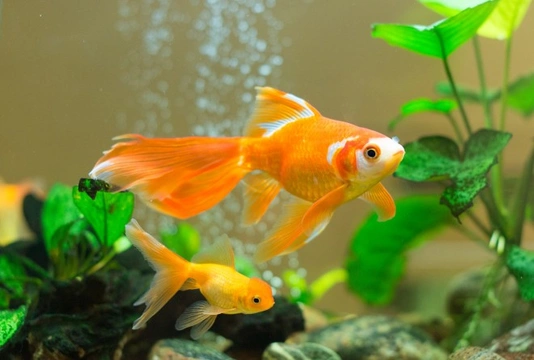
Why is my goldfish bullying his tank mates?
Goldfish are among the easiest of all species of fish to keep, and can be successfully owned by people of all ages from the very young to the elderly. They are reasonably low maintenance, and assuming that their tank set up is suitable for their needs and kept healthy, will usually live for many years and rub along with each other quite happily.
However, many goldfish keepers occasionally face a problem that can cause real upset within the tank and actually affect the health of the fish within it; one or more goldfish bullying the others. In some cases, problems such as this are short term and will sort themselves out over time, but if you constantly feel as if you are witnessing world war three in your tank, it is time to take a step back, and look at why this might be happening; and what you can do about it.
In this article, we will look at some of the reasons behind why one or more of your goldfish might have become a tiny terror within your tank, as well as floating some ideas on how to resolve the problem. Read on to learn more!
Too many fish
Overcrowding in the tank can soon lead to stressed, unhappy fish who will not get on, and may even lead to fighting. Even well informed and experienced fish keepers commonly misunderstand how few fish any given volume of water should really support, and looked at objectively, most fish tanks are actually overcrowded to some extent.
Work out how many inches of fish your tank can handle and then compare this to how many fish you actually have in there; if your tank is too small, you will need to look at upgrading it, or starting a second tank to take the pressure off your current residents.
Competition for food
It is very easy to overfeed goldfish, as they always seem to be hungry and sometimes, actually begging for food! However, underfeeding your goldfish or feeding them a large amount of food at one time with a big gap until their next meal can leave your fish hungry, and cause them to fight over the food that is available.
Ensure that you feed your goldfish the right amount of food for their size and number, and feed little and often rather than occasionally and in large amounts.
Planting the tank out with live plants that are palatable to goldfish can also help to reduce aggression and fighting over food.
Illness
Goldfish can become very aggressive towards weak or ill tank mates, which is partially a survival defense to expel a sick member from the group, therefore protecting the health of the remaining fish. If one fish in particular seems to be being picked on by other fish, it is possible that it is ill or otherwise, not fit for the rigors of an active, healthy tank.
A sick or ailing fish should be removed from the tank ASAP, and having a quarantine tank to hand to deal with problems of this type is a great idea.
Spawning and breeding
In well established, healthy tanks, your goldfish may well get the urge to breed! This can generate a flurry of activity within the tank as males fight over females, and put on displays to attract a mate. Female goldfish too will be very protective of their eggs after they have spawned, and will aggressively chase away any other fish that gets too close!
Stress
Even if your tank is not overcrowded, your fish are well fed and your water parameters are perfect, your fish may still be suffering from stress. If the tank is too bright or lit for too many hours per day, this can not only lead to algae growth, but stressed fish who may behave aggressively as a result. Having the tank somewhere busy where there are a lot of comings and goings and people staring into or tapping at the tank can also cause stress, which again, may manifest as aggression.
Providing plenty of tank furniture and hiding places, monitoring the amount of light the tank gets, and keeping people from bothering the fish unduly can all help with these problems.
Bossy breeds
The term “goldfish” is used as a catch-all title to describe all of the various different species of goldfish, and some of these tend to be more bossy or dominant than others. Certain breeds in particular, including the exotic Ryukin, are prone to being aggressive and bossy within the tank, and may pose a problem with smaller fish.
Certain types with long, flowing fins such as the Fantail make a particularly easy target for tank bullies, and so it is important to match the different fish in your tank carefully, to ensure that you don’t place fish that are bossy and others that are vulnerable together.



